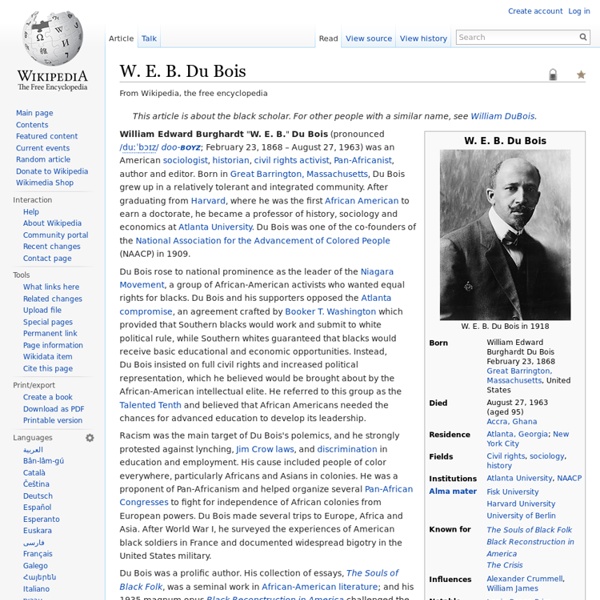John Rawls
John Bordley Rawls (/rɔːlz/;[1] February 21, 1921 – November 24, 2002) was an American philosopher and a leading figure in moral and political philosophy. He held the James Bryant Conant University Professorship at Harvard University and the Fulbright Fellowship at Christ Church, Oxford. Rawls received both the Schock Prize for Logic and Philosophy and the National Humanities Medal in 1999, the latter presented by President Bill Clinton, in recognition of how Rawls' work "helped a whole generation of learned Americans revive their faith in democracy itself."[2] Biography[edit] Early life[edit] John Rawls was born in Baltimore, Maryland to William Lee Rawls, "one of the most prominent attorneys in Baltimore,"[3] and Anna Abell Stump Rawls.[6] The second of five sons, tragedy struck Rawls at a young age. Rawls attended school in Baltimore for a short time before transferring to Kent School, an Episcopalian preparatory school in Connecticut. Career[edit] Later life[edit]
Max Weber
Karl Emil Maximilian "Max" Weber (German: [ˈmaks ˈveːbɐ]; 21 April 1864 – 14 June 1920) was a German sociologist, philosopher, and political economist whose ideas influenced social theory, social research, and the entire discipline of sociology.[3] Weber is often cited, with Émile Durkheim and Karl Marx, as among the three founding creators of sociology.[4][5][6] Weber also made a variety of other contributions in economic history, as well as economic theory and methodology. Weber's analysis of modernity and rationalisation significantly influenced the critical theory associated with the Frankfurt School. After the First World War, Max Weber was among the founders of the liberal German Democratic Party. He also ran unsuccessfully for a seat in parliament and served as advisor to the committee that drafted the ill-fated democratic Weimar Constitution of 1919. After contracting the Spanish flu, he died of pneumonia in 1920, aged 56.[4] Biography[edit] Early life and family background[edit]
Pio of Pietrelcina
Saint Padre Pio (Pius) of Pietrelcina, O.F.M. Cap. (May 25, 1887 – September 23, 1968) was a friar, priest and a mystic[2] of the Roman Catholic Order of Friars Minor Capuchin, developed from the Franciscan religious order, who adhere to the teachings and spiritual disciplines of Saint Francis of Assisi. Padre Pio is now venerated as a saint in the Catholic Church. Early life[edit] Francesco Forgione was born to Grazio Mario Forgione (1860–1946) and Maria Giuseppa Di Nunzio Forgione (1859–1929) on May 25, 1887, in Pietrelcina, a farming town in the southern Italian region of Campania.[4] His parents made a living as peasant farmers.[5] He was baptized in the nearby Santa Anna Chapel, which stands upon the walls of a castle.[6] He later served as an altar boy in this same chapel. Pietrelcina was a religious town. According to the diary of Father Agostino da San Marco, his spiritual director in San Marco in Lamis, the young Francesco Forgione was afflicted with a number of illnesses. Fr.
Yitzhak Rabin
Yitzhak Rabin (Hebrew: יִצְחָק רַבִּין; IPA: [jitsˈχak ʁaˈbin] ( ); 1 March 1922 – 4 November 1995) was an Israeli politician, statesman and general. He was the fifth Prime Minister of Israel, serving two terms in office, 1974–77 and 1992 until his assassination in 1995. He was voted number one in a 2005 Ynet poll of greatest Israelis.[2] Personal life[edit] Rabin was born in Jerusalem on 1 March 1922, Mandatory Palestine, to Nehemiah (1886 – 1 December 1971) and Rosa (née Cohen; 1890 - 12 November 1937), two immigrants of the Third Aliyah, the third wave of Jewish immigration to Palestine from Europe. Yitzhak's mother, Rosa Cohen, was born in 1890 in Mogilev in Belarus. Rabin grew up in Tel Aviv, where the family relocated when he was one year old. Rabin married Leah Rabin (born Schlossberg) during the 1948 Arab–Israeli War. Military career[edit] Palmach[edit] IDF service[edit] Ambassador and Minister of Labour[edit] First term as Prime Minister[edit] Second term as Prime Minister[edit]



